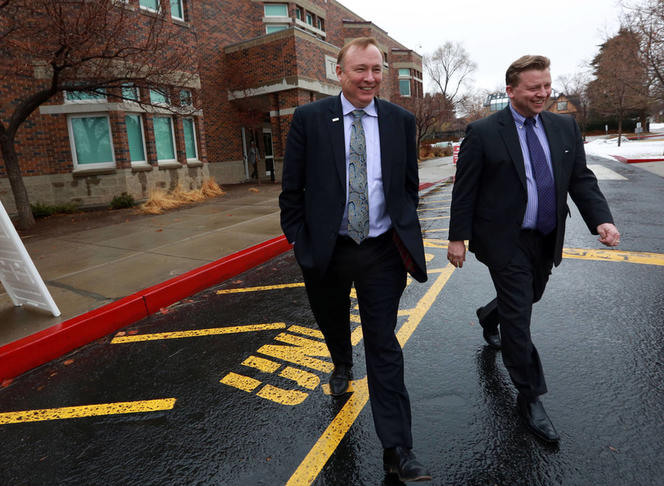Utah Senators Todd Weiler, R-Woods Cross and Jim Dabakis, D-Salt Lake City, are, according to Weiler, the Utah Legislature’s two most animated tweeters. The legislative session that ended earlier this month provided them plenty of opportunity.
When the two go back and forth on Twitter, Weiler said followers assume they can’t stand each other, but in reality, they’re fond friends — Weiler likens it to two puppies play fighting. Behind that effect are philosophies in common for the two senators on rules of decorum between politicians and their followers on social media.

“I believe a good, free flow of ideas is a good idea,” Dabakis said.
But Dabakis said he doesn’t have “any place” for Twitter users who get vulgar or attack other people.
Weiler said he is the same way.
“I enjoy a good ribbing,” Weiler said. “I enjoy some clean fun. But there are certain people that are just mean and unnecessarily nasty.”
Weiler said he has started blocking more freely after a period of trying to placate Twitter haters or users who scornfully mocked his LDS religion.

Dabakis and Weiler also each have their own ways they use Twitter to enhance their offices. Dabakis said going after big-name politicians with big staffs and big budgets qualifies as fair game and even a public service.
“In Utah, we just don’t have a two-party system,” Dabakis said. “(Representatives) go to the safe parts of their district and they set up filtering systems so that they never really have to talk to voters … so people are forced to communicate with their own Congress people via social media.”
Dabakis justifies personal attacks on Twitter in the name of keeping high-level politicians — like the governor or members of Utah’s congressional delegation — accountable and in touch with their constituents.
Weiler, on the other hand, said he uses Twitter as a testing ground to “pre-vet” new ideas.
“Sometimes I throw things out there that I’m thinking of just to see what kind of pushback I get,” Weiler said. “Especially on a new issue, it’s a way for me to kind of flesh out the arguments and see what the liberal thinking is on this or what people are thinking that I haven’t thought of.”
During President Donald Trump’s candidacy, and during his first few weeks in office, he used Twitter as a tool to call out individuals. Dabakis said it’s unacceptable.
“It’s a power that is in great imbalance,” Dabakis said. “When the President of the United States goes after a federal judge who is unable to respond, or the President of the United States goes after a corporation, or goes after a woman — as the president did one time personally — that’s unfair. It’s un-American, and it’s tacky.”
Weiler said he also questions the propriety of some of President Trump’s tweets, but he knows what it feels like to come under fire for speaking his mind via Twitter as an elected official.
An avid BYU football fan, Weiler sometimes uses Twitter — what he calls his “snarky outlet” — to pick on the University of Utah. He said he inevitably gets criticized for behavior unsuitable for a senator.
“There are people that kind of think that if you’re an elected official that you have to always be Mr. Diplomat,” Weiler said. “But I also think I have a lot of people that like me because I’m not afraid to just kind of show who I am and not pretend like I’m some stuffy old curmudgeon when I’m really not.”
Both politicians said President Trump’s Twitter style has normalized a more bold and aggressive climate in politics. However, Weiler thinks the president only embodies a culture that already existed.
Weiler said President Trump’s Twitter culture has “trickled up” to local politics.
“I think Twitter has its own kind of personality, and Trump understood it,” Weiler said. “Trump embraced it, and so I really think it was more of a trickle up. I think Trump’s doing on Twitter what others have been doing for years.”
See also “Facebook echo chambers divisive.”




